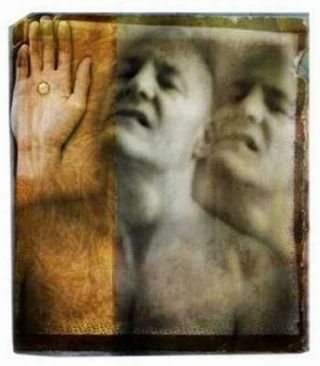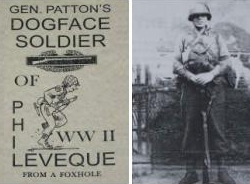
Publisher:
Bonnie King
CONTACT:
Newsroom@Salem-news.com
Advertising:
Adsales@Salem-news.com

~Truth~
~Justice~
~Peace~
TJP
Apr-02-2010 16:09

 TweetFollow @OregonNews
TweetFollow @OregonNews
Dangerous Drugs for Combat Soldiers
Zombies on the Attack Part 2
Dr. Phil Leveque Salem-News.com
Of the hundreds of Army suicides, 40% of those were taking these anti-depressant drugs.
 As of 2008, 12% of troops in Iraq were on Army Drugs as well as 17% of them in Afghanistan, for a total at that time of 20,000 troops, 50% were on anti-depressants and 50% were on sleeping pills, the number is probably higher now. |
(MOLALLA, Ore.) - I wrote and posted my first article by this title on March 26, 2010. I write from a feeling and belief that my experience as a front-line Combat Infantryman, Battalion Scout, Pointman, and Forward Observer in addition to being a PTSD War Veteran, PTSD Patient and Physician who has successfully treaded about 1000 PTSD War Veterans has some validity.
For my first article I felt I was flying by the seat of my pants and I decided to search the Internet to see if anybody agreed with me. I was pleasantly surprised to see that Time Magazine, June 5, 2008, had the story America's Medicated Army. Their writer gets paid much more than I do and his revelations were far worse than my instinctive feelings and remarks.
His reports as of 2008 indicated that 12% of troops in Iraq were on Army Drugs and 17% of them in Afghanistan with a total at that time of 20,000 troops, 50% were on anti-depressants and 50% were on sleeping pills (note: it must be more now).
He reported that in the U.S. there were 147 million prescriptions filled (for civilians).
What was really striking was that the Army stated that 70% of “Battle Stress” victim patients recovered and went back into action??? He reported that 20% had "Temporary Stress Injuries" and 10% had "Stress injury" These latter two were defined as having anxiety, irritability, insomnia, apathy, pessimism, panic, rage, severe tremors, and temporary paralysis. These he implied were part and parcel of PTSD leading to Divorce, suicide and psychological breakdown. He was certainly correct on that!
He quoted from the book Combat Stress Injury by Charles Figley and William Nash with the premise that therapy for the above was to alleviate the debilitating and intolerable symptoms stated above, and that treatments with anti-depressants like Prozac, Zoloft, Paxil and Celexa were used to keep troops deployed.
During this time the FDA issued BLACK BOX warnings that these drugs caused suicides and disabling adverse side effects and caused impaired memory, impaired judgment, dizziness and drowsiness (these are NOT what one wants in a frontline Combat Soldier).
The symptoms to be treated with these drugs are increased fear, helplessness and horror and he/they pronounced miraculous cures. (very doubtful!!).
During all these “Lab Rat” studies, the Army shrinkologists decided that soldiers should no longer be given Lithium (for schizophrenia), anti-convulsants (usually for epilepsy) or anti-psychotics (for psychosis) but to use anti-depressants to conserve fighting strength.
The Rand Corporation did studies on PTSD War Veterans and said “evidence is inadequate to determine the effectiveness of anti-depressant drugs for PTSD et cetera.” It was pointed out that of the hundreds of Army suicides 40% of those were taking these anti-depressant drugs.
The soldier interviewed for this story was Sgt. Chris Lejeune who has PTSD, “These drugs just numbed the PTSD, I felt drugged all of the time”.
Digg had 582 comments to this story in Time Magazine with 75 of them printed.
Congratulations Time Magazine for your service to 1,000,000 plus PTSD Victims!
Here is part one: Mar-28-2010: Dangerous Drugs for Combat Soldiers - Zombies on the Attack - Dr. Phil Leveque Salem-News.com
Read all of my articles in Salem-News.com
*********************************************
Dr. Phillip Leveque has degrees in chemistry, biochemistry, pharmacology, toxicology and minors in physiology and biochemistry. He was a Professor of Pharmacology, employed by the University of London for 2 years, during which time he trained the first doctors in Tanzania. After training doctors, he became an Osteopathic Physician, as well as a Forensic Toxicologist.


Email him: ASK DR. LEVEQUE
More information on the history of Dr. Leveque can be found in his book, General Patton's Dogface Soldier of WWII about his own experiences "from a foxhole". Order the book by mail by following this link: DOGFACE SOLDIER OF WWII If you are a World War II history buff, you don't want to miss it.
Articles for April 1, 2010 | Articles for April 2, 2010 | Articles for April 3, 2010




Salem-News.com:

Terms of Service | Privacy Policy
All comments and messages are approved by people and self promotional links or unacceptable comments are denied.
Dr. Leveque April 12, 2010 2:33 pm (Pacific time)
To Haggerty 4/2/10: This is the most interesting email response I think I have ever had regarding PTSD. The writer says "of all of those I know...who have been diagnosed with PTSD, including 100%, notone does any type of drugs, none. It isn't just the combat, it's the entire dynamic." I must politely disagree with this comment. The VA is jam packed with PTSD Vets. Many thousands are being prescribed Anti-depressant drugs and many even more dangerous even lethal drugs. It is a national disgrace. Search DANGERS OF ANTIDEPRESSANT DRUGS.
Haggerty April 2, 2010 5:48 pm (Pacific time)
There are countless variables that come into play in regards to who will develop PTSD, it's severity, and it's possible duration. For many it is a lifetime experience. One of the biggest impacts outside of the combat experience is one's social base upon returning home and of course the treatment that veterans receive. Unfortunately we have some pretty thoughtless people out there as individuals, and of course the media. Hollywood even to this day has made the Vietnam veteran to be absolutely nuts, when in fact it was these veterans who had the best military and educational backgrounds up to that time, and still received the most shoddy treatment. To understand PTSD, one also needs to understand it from the perspective of the same war and what was happening both while in combat and what it was like when returning home. While I was in, there were many career military from WWII and Korea who also served in Vietnam (my war). I cannot really relate to the earlier wars but those career soldiers who also served with me can relate to me about Vietnam. Of all those I know who have lived as close to normal lives as possible who have been diagnosed with PTSD, including 100%, not one does any type of drugs, none. It isn't just the combat, it's the entire dynamic.
[Return to Top]©2026 Salem-News.com. All opinions expressed in this article are those of the author and do not necessarily reflect those of Salem-News.com.